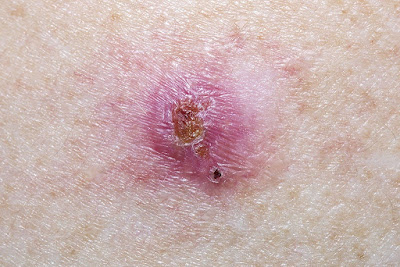On this Spotlight article I'll be discussing Bret Hart's recent diagnosis of skin cancer. As always, please review the disclaimer at the bottom of the article.
Background
On 1/30/20 Bret Hart revealed on his Instagram that he had recently been diagnosed with basal cell carcinoma, a form of skin malignancy. He used this post as an opportunity to spread a message of being proactive about one's health and - in particular - wear sunscreen. |
| Bret's posted photo showing his left shoulder wound and associated sutures. Image courtesy of Bret Hart's Instagram account. |
Diagnosis Discussion
Basal cell carcinoma is one of the most common skin malignancies and one of the most common malignancies overall. It is so common that most cancer research excludes it from data because it would confound research done on other cancer diagnoses. It most commonly occurs in fair-skinned people in sun exposed areas. No surprise then that the head, neck, shoulders, and upper back are most commonly affected.Most basal cell cancers are slow growing and it's not uncommon for a person to have one for months on their skin and only get it checked out when it starts to bleed a bit. They almost never metastasize (go elsewhere in the body). And while they can be locally aggressive, chewing into underlying muscle, bone and the like, this is usually only when people leave them for too long.
 |
| Typical appearance of a basal cell carcinoma. The central scabbed over area is a concerning finding as is the asymmetry of the lesion. Image courtesy of Stanford University Medical Center. |
Conclusion/Prognosis
The Hitman is almost certainly going to be just fine. In the rare instance that this is a more aggressive basal cell cancer, the shoulder is a good place for it to occur because there aren't any major life-altering structures near the skin surface there.Bret gets huge points for using this as an opportunity to promote health awareness and sunscreen use. Let's all be cognizant of our time out in the sun. And please go see your primary physician and/or a dermatologist if you have a skin lesion that is new, asymmetric, changing, or bleeding.
Disclaimer: These articles are general discussions about medical topics/diagnoses. As we are not personally interacting with wrestlers and do not have intimate knowledge of their maladies, we cannot comment specifically on their medical courses unless information has been previously freely reported. These articles reference wrestlers as examples based on what is either reported by them or their companies, but what is said beyond that is only speculation based on the general course of a given diagnosis. Any information here should not be used for self-diagnosis. If you are experiencing medical issues yourself, I advise you to see a licensed physician for a full evaluation.
WHAT ARE YOUR THOUGHTS?
TELL US IN THE COMMENTS BELOW!










0 comments: